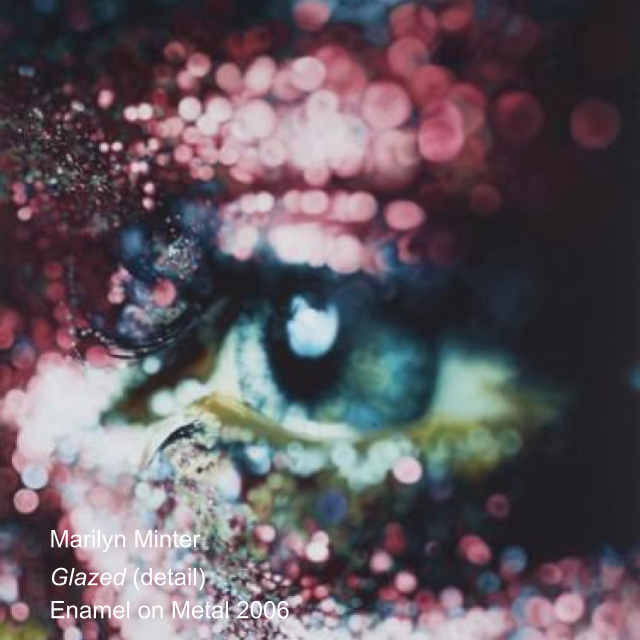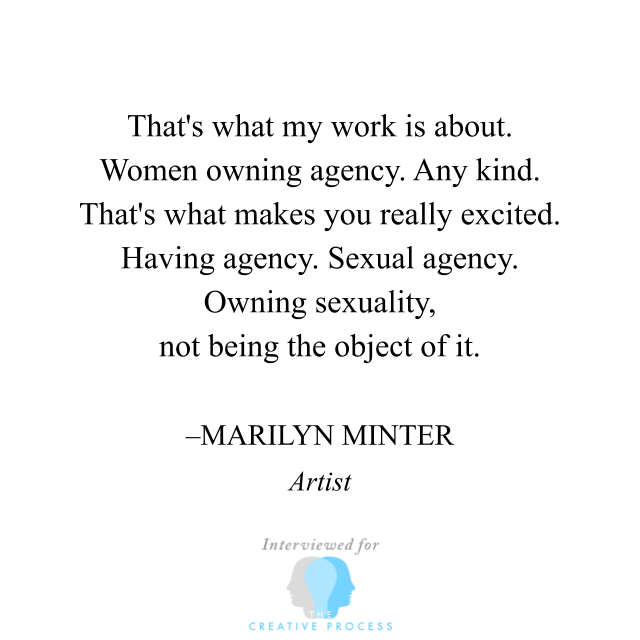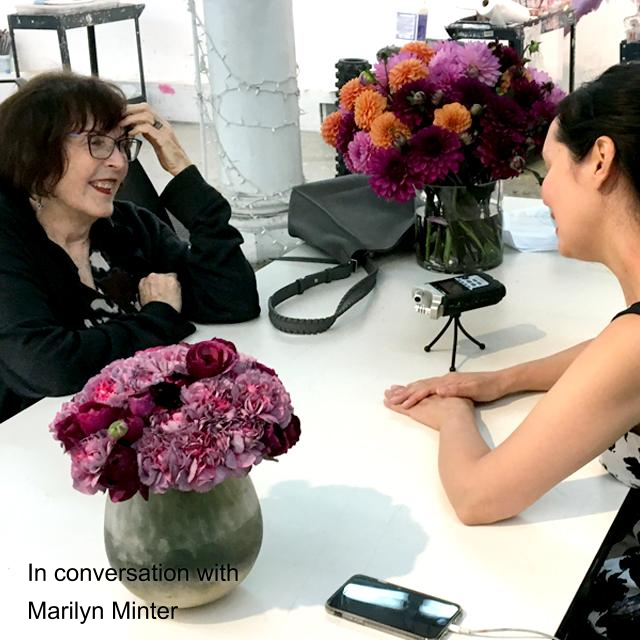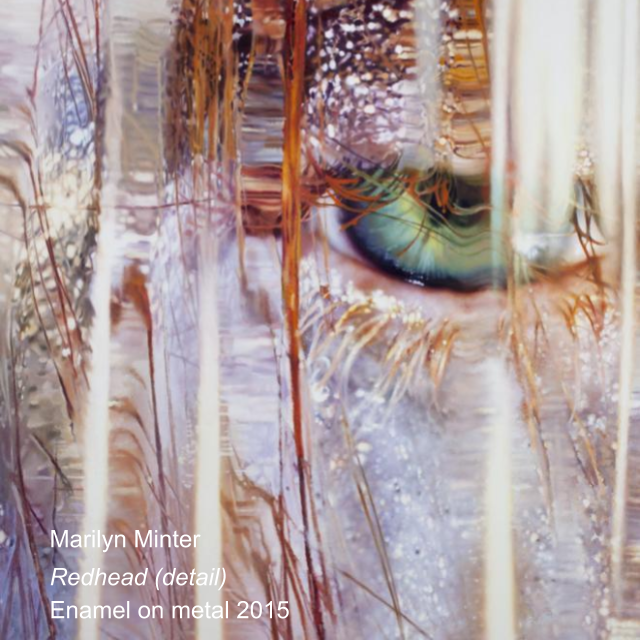Marilyn Minter (b. 1948, USA) lives and works in New York. In 2006, Minter was in the Whitney Biennial and collaborated with Creative Time to install billboards throughout Chelsea in NYC. Her video Green Pink Caviar was shown in the lobby of the MoMA from 2010-11 and on digital billboards in Los Angeles and New York. In 2013, Minter was featured in the exhibition Riotous Baroque, which traveled from Kunsthaus Zürich to the Guggenheim Bilbao. In 2015, Minter’s retrospective Pretty/Dirty opened at the Contemporary Arts Museum, Houston, TX and traveled to the Museum of Contemporary Art, Denver, Orange County Museum of Art, and the Brooklyn Museum in November 2016. Minter is represented by Salon 94, New York, Regen Projects, Los Angeles and Baldwin Gallery, Aspen.
MARILYN MINTER
There's a part of me that feels like being slightly marginalized makes me hungrier.
THE CREATIVE PROCESS
Some of your earliest work was photographs of your mother.
MINTER
Well, I was 19, and it's kind of this bastardized glamour. My mother was a drug addict, and there were pictures of high-end addiction, and most people aren't used to seeing that. They're used to seeing drug addicts on the street with a needle in their arm or something, you know? High-end addiction.
THE CREATIVE PROCESS
Is it painful to take photos like that?
MINTER
No, because I don't see what you see. I just see Mom. My brothers and I have no idea what you guys see. How would we? Why do people like these photos so much? Why are they so intense? I have to try and mirror them and see them through other people’s eyes. I never got it. We never got it. How would we? That's all we knew.
THE CREATIVE PROCESS
It is...I don't mean to say painful, but it takes artistic courage to do things, to share your life...
MINTER
But I didn't know it was even odd. There was no courage whatsoever to share those. I was shocked at the way people reacted. They'd say wow. They'd go [gasp] ‘Oh, my god, that's your mother?’ Like that. And I went, ’Yeah.’ Shame, waves of shame would come over me. I really didn't have a clue. I mean, I grew up in South Florida. There were a lot of women that looked like my mother. Not as extreme, perhaps.
THE CREATIVE PROCESS
It's interesting. There's the sense of the glamor, too. So it's both things where I see the contrasts, even in your work now.
MINTER
Yes, a point can be made. Lots of people have made it. This kind of bastardized glamor.
THE CREATIVE PROCESS
You have projects. You've had billboard projects, political, video, and collaborations with other artists in other mediums...
MINTER
I've done a lot of collaborations in the sense that I encourage artists. I get artists to collaborate with this super PAC that I have. So that they will make an edition so that we can sell it out and use that money to contribute to progressive causes. So those are collaborations in a way.
THE CREATIVE PROCESS
So what are some of the projects that came out of that?
MINTER
Richard Prince made a print that sold out in an afternoon. $350,000 or something. And he gave us two paintings. You know, there are a lot of really political artists... Now you're getting these real fascists, too. Like "send her back" people. There's just a huge hatred of something new. And maybe every hundred years we have to fight fascism as a culture. Now it's more globalized. People are afraid of change.
THE CREATIVE PROCESS
And that's so impossible to go back to the past. It doesn't make any sense.
MINTER
It's impossible. It never happens. There is no past. That was an illusion anyway.
THE CREATIVE PROCESS
The sense of time...
MINTER
White America. It's never been White America. This is a nation of immigrants.
THE CREATIVE PROCESS
And that's what makes it strong, anyway.
MINTER
Yeah, it's ridiculous. My generation has to die the fuck out.
THE CREATIVE PROCESS
That's a good epitaph!
MINTER
They're just you know the ones that are fueling this. Old white men. The women are finally abandoning him.
THE CREATIVE PROCESS
And 2020 is also the centenary of suffrage as well. So, it's a really important year. And when you think of changes that have taken place looking back at the centenary year.
MINTER
Well, I think change is progress, you know. I welcome change. I welcome a multicultural country. I welcome when we're all a shade of brown. You know, I think that's gonna be great. Maybe we will all get along a little better.
THE CREATIVE PROCESS
And it's interesting. So, you mention Marilyn Monroe and those kinds of icons of beauty which are really victims as well.
MINTER
Always.
THE CREATIVE PROCESS
How would you define your kind of icons of beauty? Not even icons but your versions?
MINTER
You know, there are things I think are beautiful nobody else does. You know, that's what I've seen?
THE CREATIVE PROCESS
Who do you think today are–could be women, men, or transgender, whatever–who do you think: that's a compelling version of beauty?
MINTER
Well, you know, it changes all the time. I think beauty is for me, what I find really beautiful is something fresh. Something I've never seen before. Or, you now, the usual––kittens and sunsets.
THE CREATIVE PROCESS
But you're not going to paint those!
MINTER
No, no, because I don't own it. I can't make anything fresh out of that. Whereas I can find things to make a fresh vision from. That's what I'm interested in.
Oh, I don't really look for inspiration. I just let it come to me, but I don't stop working. So work comes from work. So when I'm stuck I just keep working and make terrible looking things until something else comes out of it. That's the creative process. Work comes from work. You can't think yourself out a right action. You have to act yourself into right thinking. You can't sit there and smoke cigarettes and look at the wall waiting for inspiration.
THE CREATIVE PROCESS
Yeah, that's true. It is a physical labor.
MINTER
It's a physical labor. Move a muscle, change a thought.
THE CREATIVE PROCESS
And that is a very strange thing, too, as I think about body shame or this division. There has been this classical division between thought and the body.
MINTER
Well, it's only concerning women. It's constantly about policing women's bodies or slut-shaming women, and that's what my work is about. Women owning agency. Any kind. And that's what makes you really excited. Having agency. Sexual agency. Owning sexuality not being the object of it.
THE CREATIVE PROCESS
You also teach at the School of Visual Arts. What do you get from that exchange?
MINTER
Oh, I love teaching. Well, I'm good at it. And, I know it, and I enjoy it. And I'm very good at helping people find their inner voice and do what they're supposed to do. And the exchange is, it's a service position. I enjoy it, and I watch people grow and change and develop. And nothing's better than that.
THE CREATIVE PROCESS
What is the importance of the arts for you?
MINTER
Well, it's the only thing I could do. I wasn't accomplished at all in anything else. So, it was like, it wasn't like I had a choice of whether I was going to be a lawyer or an artist, or a doctor and an artist, or a secretary and an artist. The only thing I could do is draw and make art. So, I didn't have any choices, does that make sense?
THE CREATIVE PROCESS
It makes sense. It's nice to have, as you say, that focus.
MINTER
Yes and no. I mean, I wasn't good at anything.
THE CREATIVE PROCESS
Well, I think you could have been...
MINTER
Not really. I didn't think, 'Oh, maybe I'll do this as a fallback career. I had no fall back.' I sort of knew I was going to finally get a voice. I always knew it. So, I just listened to that inner voice, just keep making it whether people like it or not.
THE CREATIVE PROCESS
I think that's what makes your art powerful. You're not thinking on these two channels. It's you.
MINTER
I have no choice. I don't know what else to do. Even if I wasn’t making any money, so I couldn't rent this space, I'd still be making art. Even if I was living in upstate New York and working in my bedroom.
This interview was conducted by Mia Funk with the participation of collaborating universities and students. Associate Interviews Producer on this podcast was Michelle Ratchford.
Mia Funk is an artist, interviewer and founder of The Creative Process & One Planet Podcast (Conversations about Climate Change & Environmental Solutions).



















































































